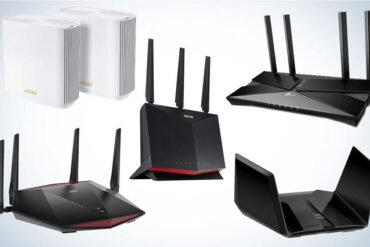Modular vs. Non-Modular Power Supplies: Which Is Better?
Table of Contents
Introduction: Understanding Power Supply Types
When it comes to building or upgrading a computer, one crucial component that often gets overlooked is the power supply. Choosing the right power supply is essential for ensuring stable and reliable performance for your system. However, with so many options available, it can be overwhelming to know which type of power supply is best suited for your needs.
In this article, we will explore the differences between modular and non-modular power supplies and help you determine which option is better for your specific requirements.
A power supply is responsible for converting AC power from your wall outlet into DC power that your computer components can use. It provides the necessary energy to keep your system running smoothly. Power supplies come in various wattages, efficiency ratings, and form factors, but the most significant distinction lies in their modular capabilities.
A non-modular power supply, also known as a fixed or hardwired power supply, has all of its cables permanently attached to the unit. This means you cannot remove or change any cables, regardless of whether you need them or not. Non-modular power supplies are typically more affordable and offer a straightforward installation process.
On the other hand, modular power supplies feature detachable cables that can be connected as needed. This modularity allows for greater flexibility and customization as you can connect only the cables required for your specific setup. It also results in a cleaner and more organized build, as unused cables can be left out, reducing clutter and improving airflow within the system.
Choosing between a modular and non-modular power supply depends on your individual needs and priorities. Here are some factors to consider:
- Cable Management: If you prioritize a clean and organized build with optimal airflow, a modular power supply is the way to go. It allows you to eliminate unnecessary cables, reducing clutter and improving the overall aesthetics of your system.
- Customization: Modular power supplies offer more flexibility in cable selection, making them ideal for enthusiasts who want to customize their system’s cables or upgrade components without replacing the entire power supply.
- Budget: If budget is a significant concern, non-modular power supplies tend to be more affordable. However, keep in mind that a modular power supply can potentially save you money in the long run by allowing for easier upgrades and reducing the need for additional cables.
In conclusion, understanding the differences between modular and non-modular power supplies is essential for making an informed decision when building or upgrading your computer. Consider your cable management preferences, customization needs, and budget constraints to determine which option is better suited for your specific requirements.
Benefits of Modular Power Supplies
Modular power supplies have gained popularity in recent years due to the many advantages they offer over non-modular power supplies. These power supplies are designed to provide a more efficient and customizable solution for powering your computer system. Here are some of the key benefits of using modular power supplies:
- Reduced Cable Clutter: One of the biggest advantages of modular power supplies is that they help in reducing cable clutter inside your computer case. With non-modular power supplies, you often have a bundle of cables that are permanently attached to the unit, whether you need them or not. This can make cable management a nightmare and interfere with airflow. However, with modular power supplies, you only need to connect the cables that are required for your specific setup, reducing clutter and improving airflow.
- Easier Installation and Upgrades: Modular power supplies make installation and upgrades a breeze. Since you only need to connect the necessary cables, it becomes easier to route them and connect them to the appropriate components. This not only saves time but also reduces the chances of making errors during installation.
- Improved Airflow and Cooling: Cable clutter can hinder the airflow within your computer case, leading to higher temperatures and potential performance issues. Modular power supplies help in optimizing airflow by allowing you to route cables more efficiently. This promotes better cooling, which can lead to improved system stability and longevity.
- Enhanced Aesthetics: Non-modular power supplies often leave you with excess cables that need to be tucked away or hidden, resulting in a messy appearance. On the other hand, modular power supplies allow you to keep your system looking clean and organized by only using the cables that are necessary.
- Flexibility and Customization: Modular power supplies offer flexibility and customization options. You can choose the cables you need based on your specific system configuration. This not only helps in reducing clutter but also allows you to upgrade or change components without buying new cables.
Overall, modular power supplies provide a more efficient, customizable, and visually appealing solution for powering your computer system. They offer reduced cable clutter, easier installation and upgrades, improved airflow and cooling, enhanced aesthetics, and flexibility for customization. Consider investing in a modular power supply to optimize the performance and appearance of your computer setup.
Advantages of Non-Modular Power Supplies
When it comes to selecting a power supply for your computer, you have the option to choose between modular and non-modular power supplies. While modular power supplies offer some advantages, non-modular power supplies also have their own set of benefits. Here are some of the advantages of non-modular power supplies:
- Cost-effective: Non-modular power supplies tend to be more affordable compared to their modular counterparts. This is because they come with fixed cables, reducing the overall manufacturing costs.
- Reliability: Since non-modular power supplies have the cables permanently attached, there are no connectors or cables that can become loose or disconnected over time. This enhances the overall reliability of the power supply, reducing the risk of power interruptions or circuit failures.
- Efficiency: Non-modular power supplies typically have a simpler design, which can lead to improved overall efficiency. With fewer connectors and cables, there is less resistance and voltage drop, resulting in more stable power delivery to your computer components.
- Easier installation: Non-modular power supplies come with fixed cables that are pre-attached to the unit. This makes the installation process simpler and more straightforward, especially for beginners or those who are not comfortable handling cables and connectors.
- Space-saving: Since non-modular power supplies have fixed cables, there is no need for additional cables that you may not use. This can help reduce cable clutter inside your computer case, leading to better airflow and improved cooling.
While non-modular power supplies may not offer the flexibility of modular power supplies in terms of cable management, they do provide several advantages that make them a viable option for many users. If you are on a budget or prefer a simpler installation process with fewer cables to manage, a non-modular power supply can be a cost-effective and reliable choice for your computer.
Factors to Consider When Choosing a Power Supply
When it comes to selecting a power supply for your computer, there are several important factors to consider. These factors will help you determine the best option for your specific needs and ensure that your computer operates efficiently and reliably. Here are some key considerations:
- Power Output: One of the first things to consider is the power output of the power supply. You need to ensure that the power supply can deliver sufficient power to all the components in your computer. Look for a power supply with a wattage rating that meets or exceeds the total power requirements of your computer.
- Efficiency: Power supply efficiency is an important factor to consider as it directly affects the energy consumption of your computer. Look for power supplies with higher efficiency ratings, such as 80 Plus Bronze, Silver, Gold, or Platinum, as they will waste less energy and generate less heat.
- Modularity: When choosing between modular and non-modular power supplies, consider your cable management preferences. Modular power supplies allow you to detach unnecessary cables, resulting in a cleaner and more organized build. Non-modular power supplies come with a fixed set of cables, which may be more suitable for compact builds or if you prefer a simpler setup.
- Connectors: Ensure that the power supply has all the necessary connectors to support your components. Check for the required motherboard, CPU, GPU, and peripheral connectors to avoid compatibility issues.
- Quality and Reliability: Opt for power supplies from reputable brands known for their reliability and quality. A reliable power supply will help protect your computer components from power fluctuations and potential damage.
- Noise Level: Consider the noise level of the power supply, especially if you prefer a quiet computing experience. Look for power supplies with quiet fan operation and features like “fanless mode” to minimize noise.
- Warranty: Check the warranty offered by the manufacturer. A longer warranty period often indicates higher confidence in the product’s quality and durability.
By considering these factors, you can make an informed decision when choosing between modular and non-modular power supplies. Remember to assess your specific requirements, budget, and preferences to find the power supply that best suits your needs.
Conclusion: Making the Right Choice
When it comes to choosing between a modular and non-modular power supply, there are several factors to consider. Both options have their advantages and disadvantages, and ultimately, the decision will depend on your specific needs and preferences.
If you value flexibility and tidiness in your build, a modular power supply is the way to go. Being able to connect only the cables you need can greatly improve airflow and reduce clutter inside your case. This not only improves the overall aesthetics but also enhances the cooling performance of your components. With a modular power supply, you can easily swap or upgrade cables without having to replace the entire unit, making it a more cost-effective option in the long run.
On the other hand, if you have a fixed build with no plans for modification or customization, a non-modular power supply might be sufficient for your needs. Non-modular power supplies are generally more affordable and have a simpler installation process since all the cables are permanently attached. They are also slightly more efficient due to the absence of additional connectors, which can cause slight power losses.
However, it’s important to note that the differences in efficiency and performance between modular and non-modular power supplies are minimal and may not be noticeable in most scenarios. Both options are capable of delivering reliable power to your components, ensuring smooth operation and preventing any potential damage.
To make the right choice, consider the following:
- Evaluate your budget and determine how much you are willing to spend on a power supply.
- Assess your build requirements and decide if modularity is necessary for your specific setup.
- Weigh the importance of cable management and airflow optimization in your case.
- Consider any future plans for upgrades or modifications to ensure compatibility and flexibility.
Ultimately, the decision between a modular and non-modular power supply comes down to personal preference and the specific needs of your build. Both options have their merits, so take the time to evaluate your requirements and make an informed choice that suits your budget and goals.


























